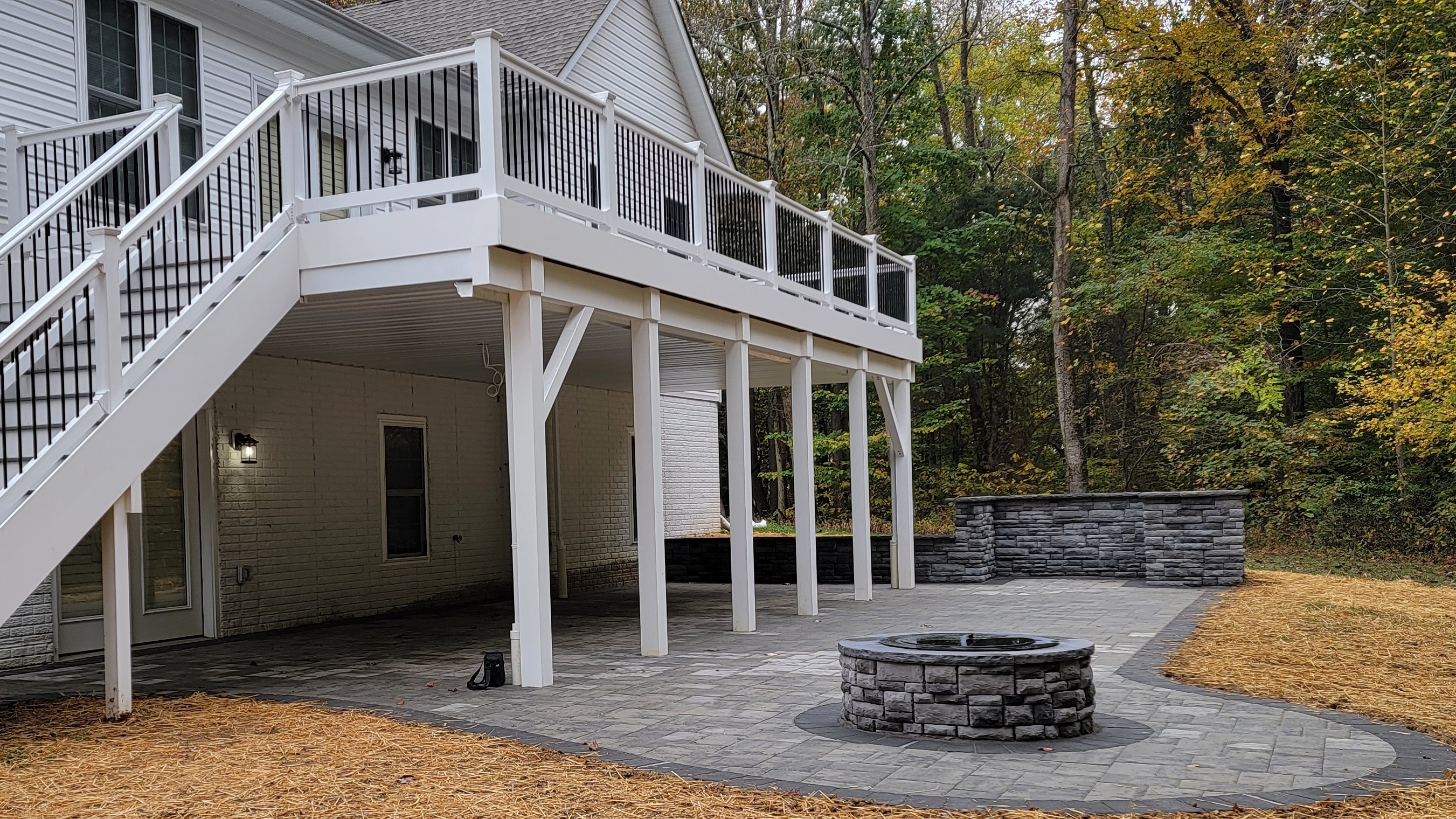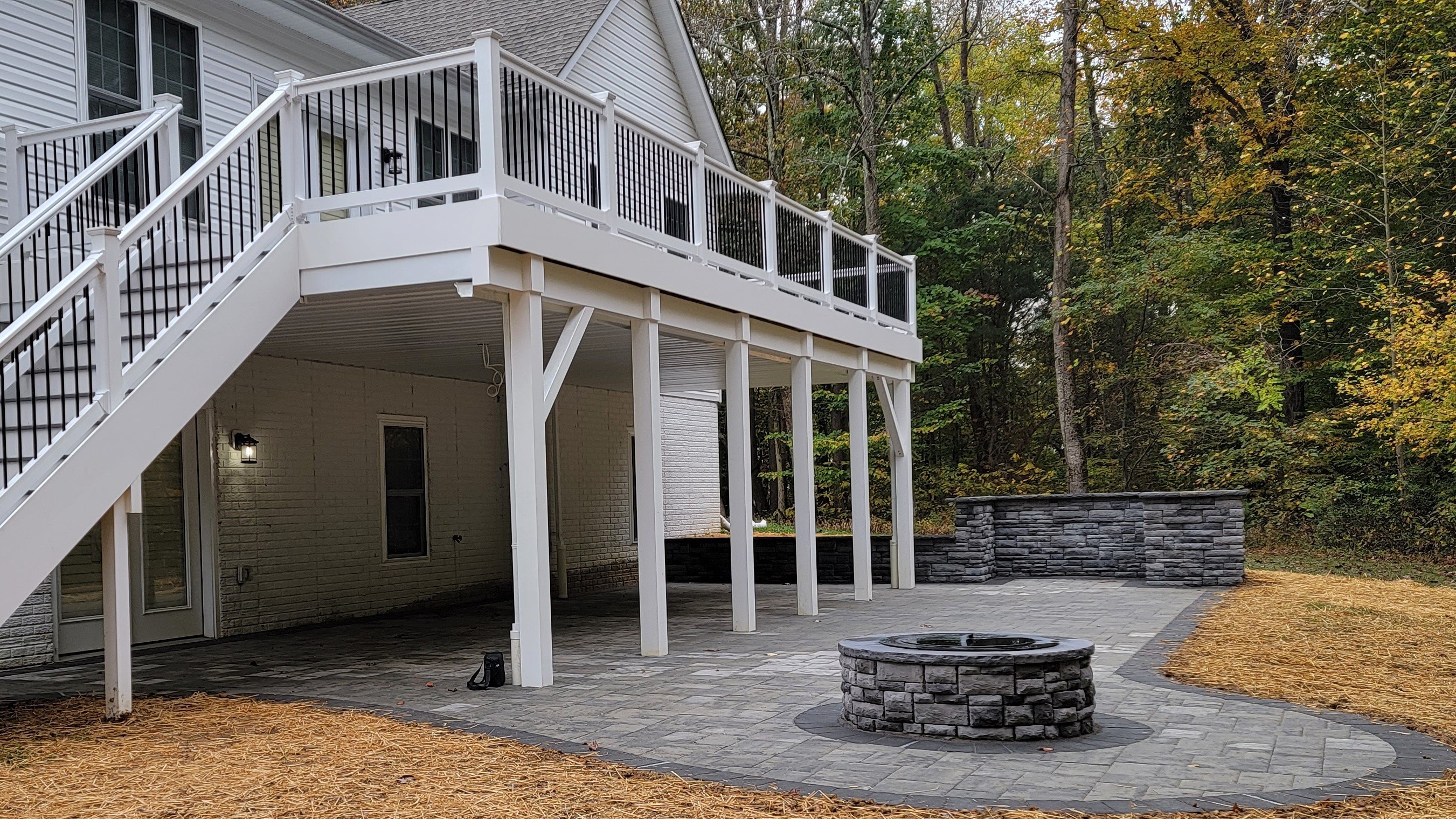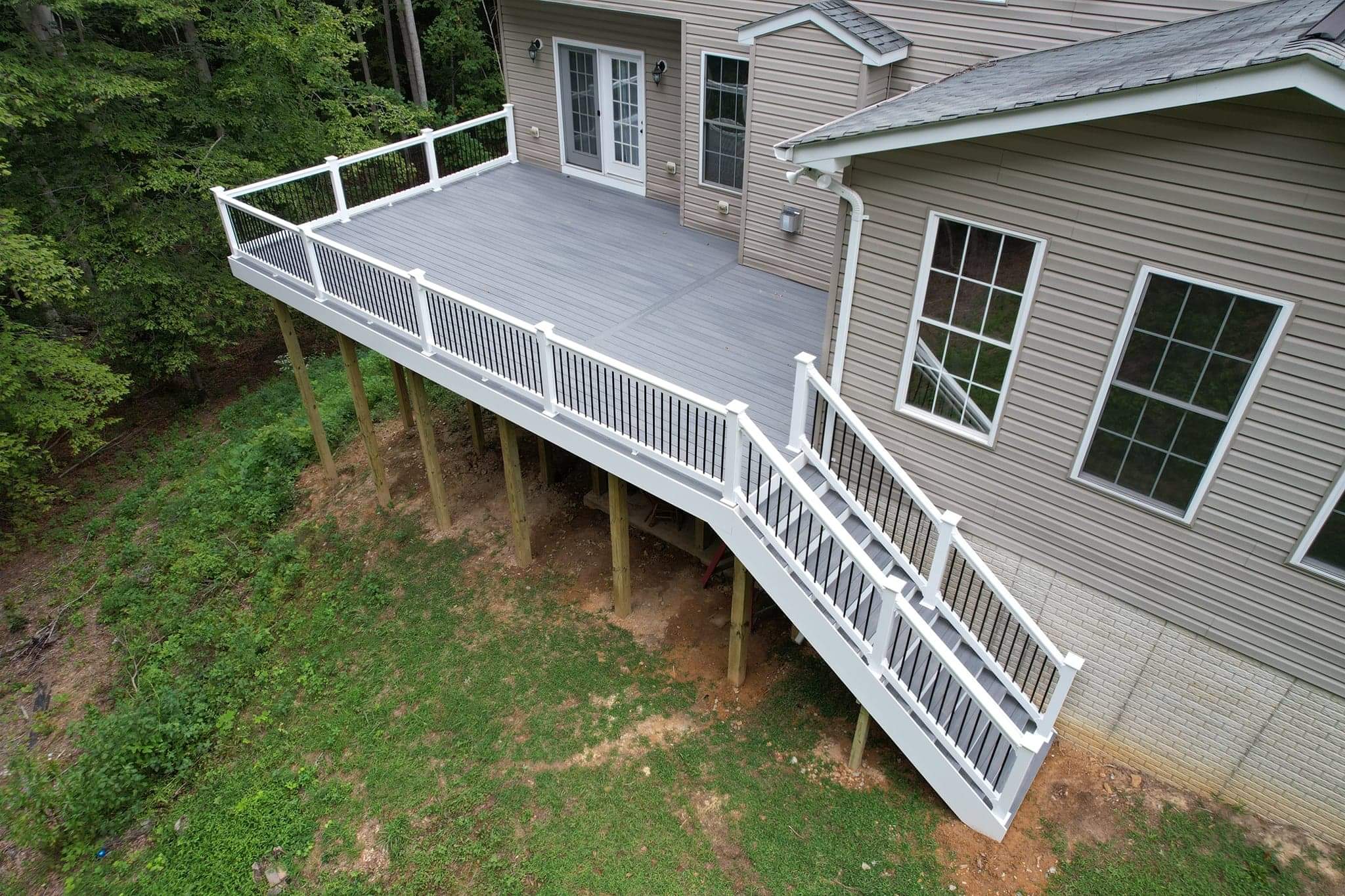
You want to spend more time outdoors, but you’re not sure how: patio or deck?
At KP Contracting, we’ve built (and love building) both. We’re familiar with both sides of the debate, but we realize the argument is sometimes more of a negotiation. And that negotiation revolves less around patios or decks than around another question: what’s right for you?
To put it in cheesy terms, who should the winner be in the “patios vs. decks” battle? You, the homeowner. But that win requires information about what patios and decks do well, and not-so-well. And those “wells” and “not-so-wells” depend on things like what you want, how long you’ll be in your house, and what sort of backyard you’ve got.
In this post, we’ll review the pros and cons of decks and patios. By the end of this post, you’ll have the beginnings of the info needed to negotiate between patio and deck, and start taking next steps.
Deck Pros
Resale value
Resale value and ROI are the principal benefits of a deck. If you’re thinking of selling your home at any point, a deck will almost certainly provide more resale value. According to Homeadvisor, decks recoup 70% of their cost when selling a home, whereas patios only get back 50%.
2023 data from Zonda, a housing industry data firm, found that new decks in the D.C. region recouped from 28.5% to 53.3% of their value on resale. Washington, D.C.-Maryland area found the following resale on a 20x16 foot deck, supported by four-inch posts, netted these resale values in Washington, D.C., and Salisbury, MD:
|
Deck type |
% recouped |
|
D.C. area, new composite deck |
41.6% |
|
D.C. area, new wooden deck |
53.3% |
|
Salisbury, MD area, new composite deck |
38.6% |
|
Salisbury, MD area, new wooden deck |
28.5% |
Information courtesy of Zonda
Since patios rarely recoup as much as decks do, if you plan on moving, a deck will likely be a better resale option. Decks are a permanent structure, and thus add more value to a home.
Line-of-sight psychology
Decks can be at the same level as the door to the outside, contrary to the steps that lead down to most patios. Having a space at that level is psychologically comforting. Placing the deck at that level makes it feel like an extension of the house. Having the deck at the same level is good for both feel and function, when you consider that you’ll probably be carrying food or drinks out to the deck at some point.

Navigating steps down to a patio with a tray full of food is more trouble than simply stepping out onto your deck.
Color and aesthetic possibilities
If a pop of color is everything to you, decks might be a better option. While patio materials like brick or stone provide a sort of color, it’s not the same visual range you get from the types of wood, and stain, available in decking. With the right stain, your deck can match most any color your home (likely) is. If you’re the sort of person who enjoys the wall of color samples at Sherwin-Williams (or gravitates towards the Post-Impressionists at the National Gallery), you’ll be right at home with the range of colors a deck can provide:
Moreover, the range of color options on decks can create accents and effects you won’t get with concrete or brick:
Sloping backyards suit decks better
Decks are a more natural option for sloped backyards. A patio in a backyard like this would look like a Picasso:

But a terraced deck, like the one above, blends more naturally into the slope.
Greater buyer satisfaction
A 2018 study by the National Realtors Association and the National Association of Landscape Professionals gave decks a higher “Joy Score” than patios (9.8 to 9.7). The Joy Score measured “the share who were happy and those who were satisfied when seeing their completed project and dividing the share by 10 to create a ranking between 1 and 10.” If you’re looking to stay in your home for awhile, you’ll be a little happier with a deck than a patio.
Less groundwork
Roots and rocks are less of a problem with a deck, since it’s raised at least a foot above the ground. Large objects will need to be removed during the groundwork stage if you’re building a patio. Unless you feel like taking a sledgehammer to the large rocks in your backyard, that’s a plus for decks.
Deck Cons
Price
Decks are more expensive than patios, by and large. And if you want to add value to your home, a deck may not be the best way to do it. Amanda Pendleton of Zillow says buyers prefer utility to volume when it comes to outdoor space: buyers prefer a small space with a purpose, to a large space without one. So, cheaper options like outdoor lighting or fire pits could add value without the cost of a deck.
Possible tax increase
Since a deck can increase your home’s value, it can also increase your property taxes. Michael Sadis of IN HOUSE Real Estate Group notes that ““Depending on the height of the deck, a CO [certificate of occupancy] may be necessary, and might require permits and potential increase in taxes.” Charles County’s Tax Assessor said there wasn’t an accurate ballpark for decks in general, but the likelihood is that a new deck will mean a higher tax rate.
According to the State of Maryland’s Office of Taxation, the tax rates for real property in Charles County as of July 1, 2023, are…
|
Charles County |
Municipal/Town/City |
County |
State |
|
Indian Head |
0.3 |
1.1020 |
0.1120 |
|
La Plata |
0.32 |
0.9990 |
0.1120 |
|
Port Tobacco |
0.04 |
1.1410 |
0.1120 |
One question is whether the resale value added by your deck will outstrip your tax burden. If other factors matter more, build away. However, if part of your purpose in building a deck is resale, definitely consider the (arguably) less lethal half of death-and-taxes.
Maintenance
A wooden deck looks beautiful, but wood rots over time if it isn’t maintained. You should check your deck at least once a year, and after major weather events to make sure this…
…isn’t happening in a place you can’t see.
Luke Olson of GTM Architects notes that “A wood deck will require the most regular maintenance, as you need to stain it every two to three years to keep the wood from deteriorating.” He recommends “Paying a bit extra for composite decking and PVC trim,” as that reduces the maintenance necessary.
Safety
Some experts argue decks are unsafe. “A well-built deck can be a beautiful, useful thing,” says Fine Homebuilding editor Matt Milham. However, “what I don’t like is avoidable risk, and to me that’s more or less the definition of a deck.” On the other hand, a deck with the proper safety features, like staggered bolts of the right side anchoring your ledger to the house, are enough to satisfy the IBC standards. That said? An improperly attached ledger can be catastrophic, and is probably responsible for 90% of deck collapses:
And while this is admittedly an outside possibility, bears can’t hibernate under patios.
Patios are Dwight Schrute approved.
Patio Pros
Customizability
Patios are more customizable. Extras like fire pits, kitchens, and water features are more easily placed (or placed at all) on a patio than on a deck. In some counties, fire pits aren’t allowed on wooden decks, or within 30 feet of a structure. Whether they’re allowed or not, putting a large open fire on top of a flammable surface isn’t the world’s best idea. Portable fire pits, like the one below, are allowed in Charles County, MD, but check your local permitting board before purchasing one. If you want the full fire pit experience, however, you’ll need a patio’s hard surface.
Patios are more of a blank canvas than decks. If you’re the sort of homeowner who looks at a space and starts imagining what they could add, a patio can be your playground.
A patio’s space allows for broader design possibilities.
Less likely to need a permit
You’re less likely to need a permit for a patio. I say “less likely,” because here in Charles County, MD, you do need a zoning permit to build a patio. However, it’s cheaper than the permit you’d need for a deck. In Charles County, a patio requires a site plan, and the day when construction will occur. You’ll also need to give the patio’s distance from property lines.
If your patio has railings or steps in Charles County, it counts as a deck. For that, you’ll need construction and site plans.
Outside of Charles County, patios need permits less often than decks. This is because many patios aren’t considered permanent structures, so the county doesn’t see the need to oversee them. This reduces the lead time on a project, so if speed is important to you, that’s a plus in the patio column.
Cheaper
Patios are generally half as expensive as decks. That’s because materials (stone, concrete, gravel) and labor are cheaper and less complicated than those for decks.
Durability/easier maintenance
If decks and patios are relationships, decks are the high-maintenance social climbers with full calendars. Patios are chill and won’t freak out if you’re late to their sister’s birthday. While the wood on decks can rot and need replacement, concrete slab patios can usually get by with a resealing and pressure washing once a year. Paver patios, if installed and drained properly, can last up to forty years.
Patio Cons
Cracking and staining
A good rule of thumb for concrete is this: there’s concrete that’s cracked, and concrete that hasn’t cracked yet. If you install a concrete patio, you will have to deal with cracks. There are engineering hacks that can reduce the cracks to just ¼ or ⅛ inch, but they’re still cracks.
If you stain (color) your concrete patio, you’ll likely need to restain. Putting sealant on top of the stain every few years is a good way to preserve color, but they still fade over time.
Less curb appeal
2018 data from the National Association of Realtors ranked patios below decks in the list of appeal to potential buyers.
More groundwork required
Paver patios require you excavate at least 7-12 inches before you install, then add a base of sand and gravel. The sand and gravel will take at least half a foot, and most paver stones (or bricks or blocks) are 3-3.5 inches thick. Paver patios will also need an irrigation system to make sure water doesn’t run over them and cause erosion.
Concrete slab patios require 6-8 inches of elevation. If your soil is weak, you’ll also be looking at concrete rebar to reinforce that concrete slab.
Patios vs. decks: leaning one way?
There are pros and cons to either option, patio or deck. The real choice comes down to what works for your yard, and what works for you. Either option can last a long time if installed and maintained well.
A few questions to consider when deciding on a patio or deck:
- are you looking for resale value?
- are you looking for options like water features, fire features, or other creative possibilities?
- what sort of maintenance are you willing to do for upkeep?
We’d love to help you with that installation, whether it’s patio or deck. Reach out to us here, or at 240-266-5900. If you’re not ready to make a decision yet, check out this post on the red flags to watch out for in a contractor, or this one on a good rule-of-thumb for picking a contractor.
